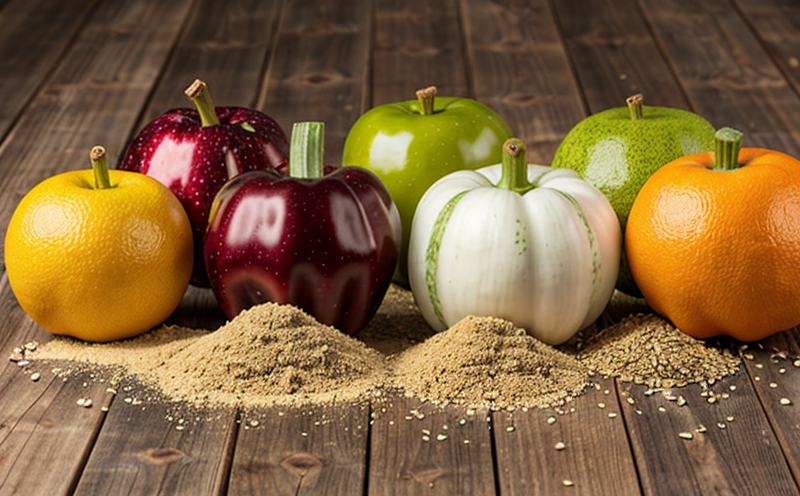ISO 7218 Microbiology Quality Control Testing in Produce Labs
The ISO 7218 standard is a cornerstone for ensuring microbiological quality control within produce laboratories. This internationally recognized standard provides detailed methodologies and criteria to ensure the safety, purity, and quality of fruits, vegetables, and grains. Compliance with this standard not only guarantees that your lab meets regulatory requirements but also enhances consumer trust by minimizing risks associated with microbial contamination.
Implementing ISO 7218 in a produce lab involves a series of meticulously planned steps aimed at maintaining the highest standards of quality control. Specimens are rigorously prepared according to prescribed protocols, ensuring that they accurately represent the product being tested. The testing process typically includes sampling, pre-treatment, inoculation, incubation, and subsequent analysis using advanced microbiological techniques.
One of the key aspects of ISO 7218 is its emphasis on environmental control within the laboratory setting. This ensures that any microbial growth observed can be attributed to the product under test rather than external factors such as air contamination or cross-contamination from other samples. The standard also mandates strict hygiene practices and sterilization procedures to maintain a sterile environment.
Another critical element of ISO 7218 is its focus on data integrity and traceability. All steps in the testing process, including sample preparation, inoculation, incubation, and analysis, must be meticulously documented. This not only aids in replicating results but also provides a clear audit trail should any discrepancies arise.
The application of ISO 7218 extends beyond mere compliance; it serves as an invaluable tool for continuous improvement within produce labs. By adhering to this standard, laboratories can identify areas for enhancement and implement corrective measures proactively. This proactive approach not only minimizes the risk of contamination but also contributes significantly to the overall quality assurance process.
The implementation of ISO 7218 in a produce lab is a multifaceted endeavor that requires comprehensive training for all personnel involved. Understanding the intricacies of this standard ensures consistent application across various testing scenarios, thereby enhancing the reliability and accuracy of results. Regular audits and internal reviews further reinforce adherence to these stringent guidelines.
In conclusion, ISO 7218 Microbiology Quality Control Testing in Produce Labs is not merely a regulatory requirement but a pivotal practice that underpins the trustworthiness and integrity of produce labs globally. By embracing this standard, laboratories can ensure they are at the forefront of quality assurance, safeguarding both consumer health and brand reputation.
Applied Standards
| Standard | Description |
|---|---|
| ISO 7218:2015 | This standard outlines the microbiological quality control requirements for produce laboratories. It provides detailed methodologies and criteria to ensure the safety, purity, and quality of fruits, vegetables, and grains. |
| ISO 7218:2019 | The latest revision of ISO 7218, it includes updated guidelines for modern laboratory practices, enhanced hygiene protocols, and improved data integrity measures. |
Scope and Methodology
The scope of ISO 7218 Microbiology Quality Control Testing in Produce Labs encompasses a wide range of produce items, including fresh fruits, vegetables, and grains. The methodology involves several critical steps designed to ensure accurate and reliable microbiological analysis.
Sampling is the first step, where specific protocols are followed to collect representative samples from various batches or lots of produce. Pre-treatment ensures that the sample is prepared in a manner conducive to accurate testing. Inoculation involves introducing known quantities of microorganisms into the sample for growth and analysis.
The incubation phase allows microorganisms to grow, after which they are analyzed using advanced microbiological techniques such as colony-forming unit (CFU) counting or molecular detection methods. This step-by-step approach ensures that any microbial contamination is identified early in the process, allowing for prompt corrective actions.
Data analysis and reporting form a crucial part of this testing methodology. Results are meticulously documented and compared against established thresholds to determine compliance with quality control standards. Any deviations from these standards necessitate investigation and rectification measures to prevent potential issues downstream.
Environmental and Sustainability Contributions
The implementation of ISO 7218 Microbiology Quality Control Testing in Produce Labs not only enhances the quality of produce but also contributes positively to environmental sustainability. By ensuring that produce is free from harmful microbial contaminants, this standard minimizes waste associated with contaminated products.
Furthermore, adherence to strict hygiene and sterilization protocols helps reduce cross-contamination within laboratories, leading to more efficient use of resources. The detailed documentation required by ISO 7218 also facilitates better inventory management and reduces the likelihood of spoilage due to improper handling or storage.
The standard's emphasis on continuous improvement fosters a culture of innovation and sustainability within produce labs. By regularly updating practices based on new research and technologies, laboratories can stay ahead of emerging challenges, contributing to both environmental protection and sustainable food production.





